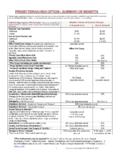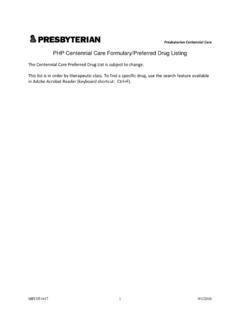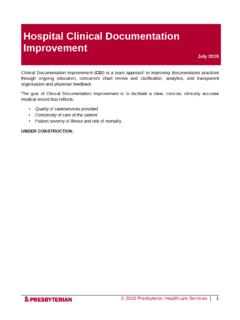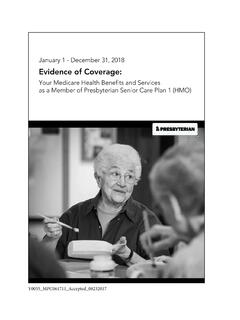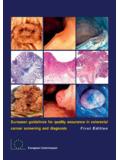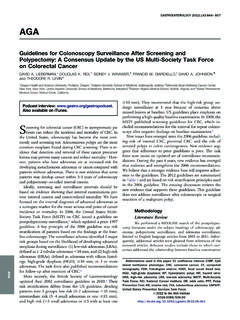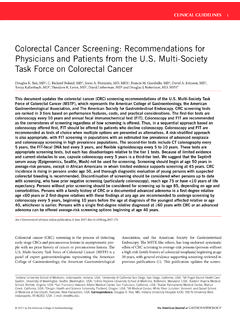Transcription of Lynch Screening-report to Cancer Committee
1 screening Lynch SYNDROME COMMUNITY 1 Prospective screening for Lynch Syndrome in a Cohort of colorectal Cancer Surgical Patients in the Presbyterian Health Care System in Albuquerque, New Mexico 2008 -2013 Final Report to the Presbyterian Hospital Cancer Committee - January 26, 2017 Paul R. Duncan, ; James T. Lin, ; Richard M. Feddersen, ; Bernard M. Agbemadzo, ,6; Karen J. Spielbusch, CNP4,6; Lisa M. Balduf, ,6 1 Hematology-Oncology Associates, PC-Emeritus Member and Presbyterian Hospital medical staff Albuquerque, NM 2 Raymond G. Murphy VA Medical Center, Albuquerque, NM (member of Presbyterian Medical Staff 2005-2009 and member of original LS screening Committee .)
2 3 Pathology Associates of Albuquerque, Presbyterian Hospital medical staff and Director of Histology and Immunohistochemistry TriCore Reference Laboratory, Albuquerque, NM 4 Presbyterian Medical Group medical oncology 5 Presbyterian Medical Group general surgery 6 Presbyterian Hospital Medical Staff, Albuquerque, NM This report represents original work by the authors. screening Lynch SYNDROME COMMUNITY . screening Lynch SYNDROME COMMUNITY 2 Acknowledgements The authors thank the following health care professionals for their assistance in data retrieval. Francisco Ampuero, , Gynecologic Oncology, Albuquerque, NM Mitchel Binder, , Presbyterian Medical Group Oncology, Albuquerque, NM William Brown, , Presbyterian Medical Group Surgery, Albuquerque, NM Karen Finkelstein, , Southwest Gynecologic Oncology, Albuquerque, NM Annette Fontaine, , Member CCGCRN-New Mexico Cancer Center, Albuquerque, NM Darling Horcasitas, PA, Member CCGCRN-New Mexico Cancer Center, Albuquerque, NM Luis Padilla-Paz, , Women s Cancer and Surgical Care, Albuquerque, NM Malcolm Purdy, , Hematology-Oncology Associates at Lovelace Cancer Care, Albuquerque, NM Thomas Riley.
3 Presbyterian Medical Group Gastroenterology, Albuquerque, NM Kenneth Smith, , Presbyterian Medical Group Oncology, Albuquerque, NM Victor Vigil, , Member CCGCRN, Women s Cancer and Surgical Care, Albuquerque, NM Disclosures: none This research did not receive any specific grant from funding agencies in the public, commercial or not-for-profit sectors. screening Lynch SYNDROME COMMUNITY 3 Prospective screening for Lynch Syndrome in a Cohort of colorectal Cancer Surgical Patients in the Presbyterian Health Care System Albuquerque, NM 2008-2013 ABSTRACT Background: Lynch syndrome, the most common hereditary colorectal Cancer syndrome, is responsible for approximately 3% of newly diagnosed colorectal Cancer patients.
4 Tumor mismatch repair screening for Lynch syndrome is uncommon in community hospital Cancer programs accredited by the American College of Surgeons Commission on Cancer in the United States. This study describes a prospective molecular screening program for Lynch syndrome identification utilizing a community hospital colorectal Cancer surgical cohort 60 years of age. Study Design: From January 2008 through December 2013, 815 patients with newly diagnosed colorectal Cancer underwent colorectal surgery. The study group consisted of the 218 patients who were 60 years of age. This group had their surgical specimens analyzed for a mismatch repair defect, the hallmark of Lynch syndrome, either by immunohistochemistry or microsatellite instability.
5 In the last years of the study, specimens exhibiting microsatellite instability were further screened with a MLH1 promoter methylation assay. Results: Twenty-five patients of the study group (11%) had pathology specimens with evidence of a mismatch repair defect. Of the 25 with a mismatch repair defect, 1 patient had a BRAF mutation and 5 patients showed MLH1 promoter methylation. Among the 19 remaining, 14 (74%) underwent genetic Cancer risk assessment. Twelve mutation positive Lynch syndrome patients were identified, which represents ( 95% CI, ) of the screened cohort. screening Lynch SYNDROME COMMUNITY 4 Conclusions: A prospective Lynch syndrome tumor- screening program can successfully identify Lynch syndrome patients in a community hospital healthcare system.
6 Other community hospital Cancer programs could use our strategy. Keywords: Hereditary Cancer ; Lynch syndrome tumor molecular screening ; Microsatellite instability; MLH1 Methylation; Community hospital INTRODUCTION: Lynch syndrome (LS) refers to individuals with a hereditary predisposition to colorectal Cancer (CRC), endometrial Cancer (EC) and certain other malignancies who have a deleterious (disease causing) germ line mutation in a mismatch repair (MMR) ,2 LS includes patients who have Cancer and those who have not had Cancer . Individuals with LS have a colon Cancer risk between 22% and 58% by age ,3 Surveillance in patients with LS can delay the appearance of new CRC and reduce mortality from CRC in both men and Each identified LS patient has on average 3 family members carrying the same mutation, multiplying the benefit of identifying an individual patient with a LS mutation at the first diagnosis of Cancer when at-risk family members can be offered genetic ,6,7 The molecular marker for the presence of a MMR defect in tumor tissue is the presence of microsatellite instability (MSI).
7 The Evaluation of Genomic Applications in Practice and Prevention (EGAPP) Working Group (EWG) found sufficient evidence to recommend routine pathologic screening (reflex testing) of all newly diagnosed colorectal Cancer tumor specimens for either MSI or immunohistochemistry (IHC) expression of the MMR proteins. For those patients with positive screening results genetic testing should be Establishing a LS screening program is labor and resource intense and requires a leader who has dedicated time to coordinate appropriate action on positive screening tests between the patient and multiple screening Lynch SYNDROME COMMUNITY 5 caregivers.
8 There are no LS screening program templates that can be applied to all clinical practice situations. Most importantly, communities must have the appropriate providers with genetic Cancer and risk assessment (GCRA) expertise and must include third party payers in the planning process. Recent publications from academic centers emphasize the complexities and pitfalls in establishing LS screening A 2012 survey found that MMR-tumor testing for LS in community hospital Cancer programs accredited by the American College of Surgeons Commission on Cancer (ACOS-CoC) are In the United States (US) 70% of Cancer patients are cared for in ACOS-CoC accredited Cancer They identified that 71% of NCI comprehensive Cancer centers (NCI-CCC), 36% of community hospital comprehensive Cancer programs (COMP) and 15% of community hospital Cancer programs (CHOP) had molecular LS screening programs in place.
9 From the survey data presented, one surmises the majority of newly diagnosed CRC patients in the US are not screened for LS. We report the experience of designing and implementing a screening program for LS in a community hospital comprehensive Cancer program (COMP) accredited by the ACS-CoC. The results of the first 6 years of screening (2008 through 2013) are presented here and an abstract of the 2008-09 results were presented in PATIENTS AND METHODS: Study Setting, Design and Patient Selection Presbyterian Health Services (PHS) is a private not-for-profit health care system and health insurance provider in the state of New Mexico.
10 PHS has partnered with the University of New Mexico in TriCore Reference Laboratories, a not-for-profit lab services corporation. The PHS Cancer program in Albuquerque is certified by the ACS-CoC as a COMP. Beginning January 1, 2008 reflex IHC for MMR proteins was performed in all patients who were 60 years of age undergoing a surgical resection for colorectal Cancer . Our analysis of the age distribution of LS in newly diagnosed CRC patients in published data showed that nearly 80% of LS diagnosis occurs in patients screening Lynch SYNDROME COMMUNITY 6 60 years of We anticipated CRC patients 60 years of age at diagnosis would comprise approximately 35% of the total newly diagnosed CRC In addition, the pathologists could reflex test any patient >60 years of age in the PHS pathology database who had a prior colorectal or other LS associated tumor.
